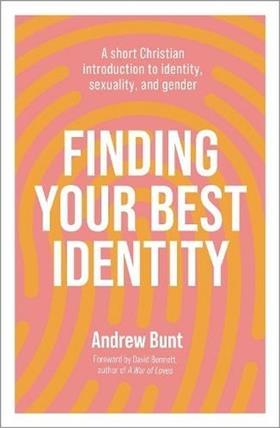Your children may know instinctively who they are, but can be confused by what they are told. In his book, Finding Your Best Identity: A short Christian introduction to identity, sexuality and gender, Andrew Bunt looks at how children are called to look within, or to those around them when their primary gaze should be on who God says we are.

Premier NexGen: Why did you write the book and what did you hope to achieve?
Andrew Bunt: I wrote it out of reflecting on my own experience, and then hoping that some of the good God has done in me around identity can bless other people. There are probably two particular areas:
1. I had recognised the fact it’s very possible to know who God says we are, and not to really experience it in a way that impacts our life. I hope the book will help others to bridge that gap.
2. I also wanted to offer something to help us in our conversations around sexuality and gender. Our culture has become so tied up with identity when it comes to these topics. Many Christians who turn away from an historic Christian perspective on this seem to be influenced by ideas of identity. They might say things like, ‘How can God ask people to deny who they really are?’. I don’t think that’s a helpful way of thinking about identity. We need to look to the Bible for foundations from which to engage with sexuality and gender.
PNG: You say in the book that you grew out of a time of gender dysphoria (when you believed you were a girl trapped in a male body) when you came to your teen years. But you also outline that you are same-sex attracted and this aspect of your life has stayed? Did you expect that you would grow out of that as you went through puberty? [For an in depth article on the terminology surrounding gender and sexuality, click here.]
AB: It’s a really helpful question. My experience of discomfort with my gender went away naturally. It’s worth saying that’s quite a common experience. The majority of prepubescent children who experience discomfort around their gender find that goes away naturally. When it comes to my sexuality, I don’t remember thinking it would ‘go away’, partly because it seemed really consistent and persistent ever since I first became aware of it, but I was open to whatever ever happened. As I reflect back though, I think it’s also important that I wasn’t building my identity on either of these things (my experience of gender or sexuality). What’s deeply unhelpful is when young people are put under pressure to work out and choose who they are based on what they feel inside. This can be confusing because of the natural fluidity that does happen around gender and sexuality, especially in teenage years. So parents and youth leaders can help young people who might be questioning their gender or their sexuality by encouraging them not to rush to make any big decisions or make statements.
PNG: Parents and youth workers may enter this kind of area with some trepidation in even broaching the subject with their children or with those within their group. From your personal experience is it right to have a degree of caution about these things?
AB: I think there can be some good motivation behind the trepidation we might feel in relation to these topics. But my encouragement to parents and other people would be to let the trepidation cause us to be careful, sensitive and thought-through in how we engage within these things, but not to let it stop us from engaging at all.
If we totally avoid these subjects, young people can think either that Christians don’t care about real-life issues that are affecting people or that the topic is deemed so abhorrent it can’t be talked about. We want to model for young people that it’s really safe to talk about these things. And we want to be sure to talk about expressing the heart and the love of Jesus right in the very midst of these conversations.
PNG: Imagine you’re a parent or youthworker trying to express the good news of Jesus in the best possible way and you have an orthodox view on what the Bible says about sexuality, believing that same-sex attracted Christians need to be celibate. You may be nervous of broaching the topic with a young person.They may be same-sex attracted or sympathetic to a more liberal view. You fear driving them away and that will be part of that trepidation. What are your thoughts on this sort of situation?
AB: There’s some good motive behind this. We don’t want sexuality to be a stumbling block to a child or teenager choosing to follow Jesus. Nor do we want them to feel that they are rejected by Jesus or by us.
I think one helpful tool is just to keep bringing things back to Jesus. We want to have conversations about sexuality, about gender, about all kinds of different areas of life and how we flourish in life, but we want to keep bringing it back to Jesus. And we show that sexuality isn’t the only big issue in life. We don’t want young people to think all Jesus cares about is their sexuality. He wants us to thrive and flourish through relationship with him and lots of how we follow Jesus well isn’t about sexuality at all. We also want to help young people to think about questions like, how do I handle my emotions? How do I handle my money? How do I think about other people? How am I someone who loves my neighbour?
PNG: You write in your book that we aren’t always best placed to decide who we are. But most children are in an educational environment (in lessons such as RSE – Relationships and Sex Education) where they are being encouraged to ‘decide who they are!’
AB: That is really key and really tricky. My understanding is that parents have always had the right to know the material that is being used to teach children in school, so it is worth finding out about that.
I wonder if part of the answer is laying a key foundation so that our children and young people understand the idea that if we choose to follow Jesus, we think differently and live differently in relation to a whole host of things. I have had interesting conversations with Christian young people who are shocked and horrified to realise that many Christians like me believe the Bible says something different to what they’re taught at school. They had no foundational understanding that being a Christian means being someone who sticks out and looks a bit odd in the cultural context.
PNG: The book is a short Christian introduction to identity, sexuality and gender. Were there areas that you had to leave out because it’s just a short introduction. If you were writing a longer book, where would you focus?
AB: I would love to have done more on who God says we are, partly because, at heart, I’m a Bible teacher. So I would have loved to look at Ephesians 1 and the spiritual blessings Paul talks about us as having in Jesus now – those are blessings that are at the heart of our transformed identity.
I would also have wanted to do more on our heart attitude towards LGBT people: how we, as individual Christians, or as churches, can love in practical ways. That would have also touched on some of the practical outworkings of singleness: if faithfulness to Jesus means celibate singleness for many, what are practical things we can do to support those who find themselves in that situation?





























